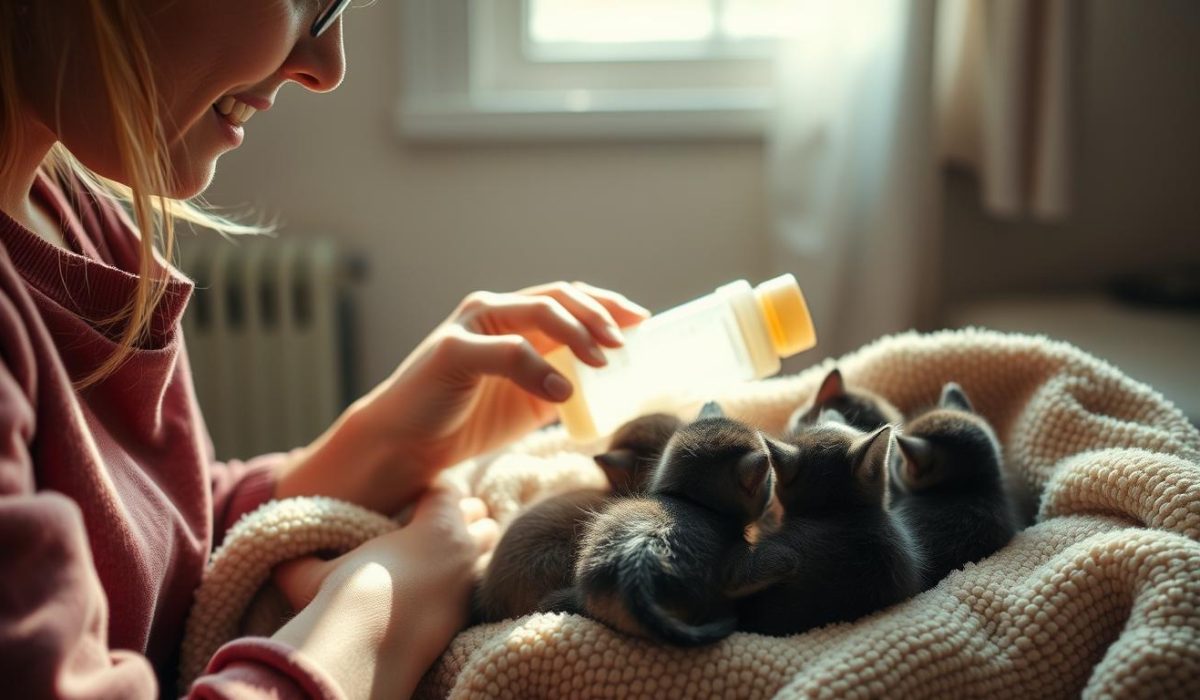Every time I hold an orphaned kitten, I feel the weight of my responsibility. These tiny ones depend on us for everything in their early days. They can’t keep themselves warm, so we must provide a safe space.
The joy of watching them grow from helpless babies to playful kittens is unmatched. But, it’s a journey filled with reminders of their vulnerability.
Nights without sleep are common when caring for these kittens. We feed them often, keep them warm, and help them with basic needs. It’s more than a job; it’s a labor of love.
Seeing a kitten grow strong and healthy is incredibly rewarding. They’re ready to find a new home with a loving family. But, there are challenges too. We must balance their diet, keep them warm, and prevent serious illnesses.
Hand-raising kittens is a test of our dedication and fills our hearts with joy. We must keep them warm and prevent infections. It’s a challenging but rewarding journey, fueled by our collective hope for these kittens’ happiness.
Understanding the Needs of Orphaned Kittens
Hand-raising orphaned kittens requires deep knowledge of their health and needs. Without proper care, their survival chances are low. Diseases like the feline panleukopenia virus are big threats, often found in shelters.
Keeping their environment warm and clean is vital. Kittens can’t keep themselves warm, so they lose heat fast. Experts say to start with a nesting area at 95°F and lower it as they grow.
Good nutrition is also key. They need formula milk that’s about 100°F, like a mother’s milk. This comforts them and helps with digestion. It’s important to watch their weight and feeding closely to avoid health problems.
Preventive health is critical. Start vaccinations early to protect against diseases. This helps keep them safe from serious illnesses.
Learning about these needs has shown me how important warmth, feeding, and health care are. These elements work together to help kittens grow strong and healthy.
Hand-Raising Orphaned Kittens
Hand-raising orphaned kittens is a rewarding yet complex task. It requires effective feeding strategies from start to finish. At the beginning, it’s key to keep their body temperature and hydration up to avoid hypothermia, hypoglycemia, and dehydration.
Proper bottle feeding is essential from the start. Newborns need to be fed every two hours with a high-quality milk replacer. This provides the nutrients and antibodies they need. It’s important to feed them on their bellies to mimic nursing and avoid milk aspiration risks.
As they get older, around three weeks, feeding frequency changes. They can handle more food and start to eat wet, slushy foods.
The weaning process is carefully managed. Kittens stay on milk replacers until they’re about six weeks old. This helps them get used to solid food gradually. It’s important to start with high-quality kitten food that’s moist.
Keeping everything clean is also key. Hand-raised kittens don’t have their mother’s antibodies to fight off infections. So, sterilizing all feeding tools after each use is a must.
Hand-raising orphaned kittens is a challenging yet rewarding journey. It requires dedication and a deep understanding of their needs. Every success story makes the hard work worth it.
The Emotional Journey of Hand-Raising Kittens
Hand-raising orphaned kittens is a unique experience filled with challenges and emotional rewards. It starts with constant feeding for newborns, leading to sleep loss and stress. Yet, the moments of growth and development are incredibly rewarding. This journey turns into a deep emotional bond, making adoption both sweet and sad.
In the early stages, kittens need bottle feeding every two to three hours. This creates a special bond and makes me their primary caregiver. The care continues through stages, from bottle-feeding to solid foods around eight weeks. It’s a detailed journey of nurturing at every step.
As kittens start to eat wet and then dry food, our bond grows stronger. Each milestone, from regulating body temperature to using the litter box, requires my full attention. This dedication is key for their health and adoption success.
The emotional journey of nurturing kittens to adoption-readiness is complex. There’s joy in seeing a kitten grow strong and healthy. Yet, saying goodbye is hard. The satisfaction of nurturing kittens and seeing them thrive in new homes eases the pain of separation.
The path of nurturing kittens is deeply fulfilling. Every moment spent caring for them leads to a rewarding outcome. These experiences give kittens a chance at life and enrich mine with unconditional love. The journey of hand-raising orphaned kittens shows the significant impact these creatures have on our lives.
Common Health Concerns in Orphaned Kittens
As someone deeply involved in the care of felines, I’ve seen the vulnerability of orphaned kittens. They often face health issues due to being separated from their mothers early. Without maternal antibodies, they are more at risk for diseases.
Keeping their environment clean is key to helping their immune systems grow. Caring for these young lives is a big responsibility. Their survival depends on the dedication of their caregivers.
Keeping them warm is essential. If they can’t control their body temperature, they might get hypothermia. This can make them look scrawny and undernourished.
Kittens can’t go without food or water for long. Severe dehydration is a big emergency for them. Veterinary care is vital, and sometimes, treatments like Lactated Ringers and Pedialyte are lifesaving.
Gastrointestinal problems are also a big issue. Diarrhea and constipation can be deadly if not treated quickly. It’s important to watch their weight and give them deworming medicine on time.
Checking their stool color and weight is important. It shows how they’re doing. Even though the odds are against them, with careful care, they can have a healthy future and find a loving home.


